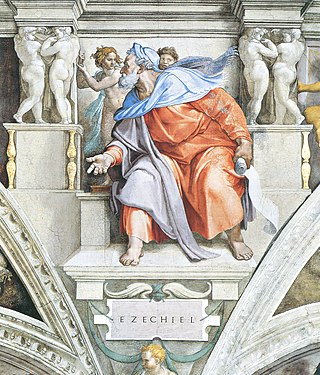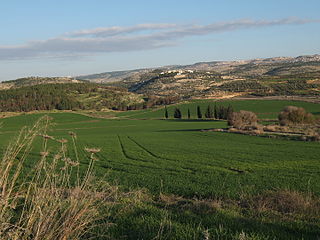See also
- All pages with titles beginning with Ezekiel
- Jeheskel Shoshani (1943–2008), Israeli evolutionary botanist
- Sagiv Yehezkel (born 1995), Israeli footballer
Ezekiel is the Graecised version of the Hebrew name Yehezkel, denoting a prophet of the Hebrew Bible. The form Ezekiel is used in the Christian Old Testament.
Ezekiel may also refer to:
The Book of Ezekiel is the third of the Latter Prophets in the Tanakh and one of the major prophetic books in the Christian Bible, where it follows Isaiah and Jeremiah. According to the book itself, it records six visions of the prophet Ezekiel, exiled in Babylon, during the 22 years from 593 to 571 BCE, although it is the product of a long and complex history and does not necessarily preserve the very words of the prophet.

Ezekiel or Ezechiel is the central protagonist of the Book of Ezekiel in the Hebrew Bible.
The Nevi'im is the second major division of the Hebrew Bible, lying between the Torah ("instruction") and Ketuvim ("writings"). The Nevi'im are divided into two groups. The Former Prophets consists of the narrative books of Joshua, Judges, Samuel and Kings; while the Latter Prophets include the books of Isaiah, Jeremiah, Ezekiel, and the Twelve Minor Prophets.

The major prophets is a grouping of books in the Christian Old Testament that does not occur in the Hebrew Bible. All of these books are traditionally regarded as authored by a prophet such as Jeremiah, Isaiah, Daniel, and Ezekiel. The term "major" has nothing to do with the achievement or importance of the prophets, rather with the length of the books. In comparison to the books of the Twelve Minor Prophets, whose books are short and grouped together into one single book in the Hebrew Bible, these books are much longer.
The New Covenant is a biblical interpretation which was originally derived from a phrase which is contained in the Book of Jeremiah, in the Hebrew Bible.

Yehezkel Kaufmann was an Israeli philosopher and Biblical scholar associated with the Hebrew University. His main contribution to the study of biblical religion was his thesis that Israel's monotheism was not a gradual development from paganism but entirely new.
According to the Talmud, there were 48 prophets and 7 prophetesses of Judaism. The last Jewish prophet is believed to have been Malachi. In Jewish tradition it is believed that the period of prophecy, called Nevuah, ended with Haggai, Zechariah, and Malachi at which time the "Shechinah departed from Israel".

The Land of Israel is the traditional Jewish name for an area of the Southern Levant. Related biblical, religious and historical English terms include the Land of Canaan, the Promised Land, the Holy Land, and Palestine. The definitions of the limits of this territory vary between passages in the Hebrew Bible, with specific mentions in Genesis 15, Exodus 23, Numbers 34 and Ezekiel 47. Nine times elsewhere in the Bible, the settled land is referred as "from Dan to Beersheba", and three times it is referred as "from the entrance of Hamath unto the brook of Egypt".
Ezekiel is a masculine Hebrew language name, meaning "God's Strength." It can be used as both a given name and a surname.

Ezekiel 7 is the seventh chapter of the Book of Ezekiel in the Hebrew Bible or the Old Testament of the Christian Bible. This book contains the prophecies attributed to the prophet/priest Ezekiel, and is one of the Books of the Prophets. In this chapter, Ezekiel announces that "judgment on Israel is near".

Ezekiel 3 is the third chapter of the Book of Ezekiel in the Hebrew Bible or the Old Testament of the Christian Bible. This book contains the prophecies attributed to the prophet/priest Ezekiel, and is one of the Books of the Prophets. This chapter contains the call to Ezekiel to speak to the people of Israel and to act as a sentry for them.

Ezekiel 14 is the fourteenth chapter of the Book of Ezekiel in the Hebrew Bible or the Old Testament of the Christian Bible. This book contains the prophecies attributed to the prophet/priest Ezekiel, and is one of the Books of the Prophets. This chapter records a visit of some of the elders of Israel to Ezekiel, and God's response through the prophet dealing with the sins of idolatry.

Ezekiel 20 is the twentieth chapter of the Book of Ezekiel in the Hebrew Bible or the Old Testament of the Christian Bible. This book contains the prophecies attributed to the prophet/priest Ezekiel, and is one of the Books of the Prophets. In chapters 20 to 24 there are "further predictions regarding the fall of Jerusalem". In this chapter, Ezekiel speaks on God's behalf to some of the elders of Israel.

Ezekiel 21 is the twenty-first chapter of the Book of Ezekiel in the Hebrew Bible or the Old Testament of the Christian Bible. This book contains the prophecies attributed to the prophet/priest Ezekiel, and is one of the Books of the Prophets. In chapters 20 to 24 there are "further predictions regarding the fall of Jerusalem", and this chapter also includes a prophecy against the Ammonites.

Ezekiel 22 is the twenty-second chapter of the Book of Ezekiel in the Hebrew Bible or the Old Testament of the Christian Bible. This book contains the prophecies attributed to the prophet/priest Ezekiel, and is one of the Books of the Prophets. Chapters 20 to 24 contain a series of "predictions regarding the fall of Jerusalem", and this chapter contains three separate prophecies centering on the inevitable punishment due to the city's guilt.

Ezekiel 28 is the twenty-eighth chapter of the Book of Ezekiel in the Hebrew Bible or the Old Testament of the Christian Bible. This book contains the prophecies attributed to the prophet/priest Ezekiel, and is one of the Books of the Prophets. This chapter contains a prophecy against the king of Tyre and a prophecy against neighbouring Sidon, concluding with a promise that Israel will be "delivered from the nations".

Ezekiel 33 is the thirty-third chapter of the Book of Ezekiel in the Hebrew Bible or the Old Testament of the Christian Bible. This book contains the prophecies attributed to the prophet/priest Ezekiel, and is one of the Books of the Prophets. This chapter opens the third and final section of the book, in which God's future blessings on Israel are proclaimed. A "complex interweaving of themes imported from the first twenty-four chapters of the book" is concerned with the concept of responsibility, including Ezekiel's own responsibility as a "watchman", and "the people's responsibility for their own moral and religious choices".

Ezekiel 35 is the thirty-fifth chapter of the Book of Ezekiel in the Hebrew Bible or the Old Testament of the Christian Bible. This book contains the prophecies attributed to the prophet/priest Ezekiel, and is one of the Books of the Prophets. This chapter contains a prophecy against Mount Seir in Edom, to the south of Judah. Biblical commentator Susan Galambush pairs it with an oracle promising "restoration to the mountains of Israel" in the following chapter.

Ezekiel 36 is the thirty-sixth chapter of the Book of Ezekiel in the Hebrew Bible or the Old Testament of the Christian Bible. This book contains the prophecies attributed to the prophet/priest Ezekiel, and is one of the Books of the Prophets. This chapter contains two prophecies, one conveying "hope for the mountains of Israel" and one declaring that Israel's restoration is assured. Biblical commentator Susan Galambush pairs the first of these with an oracle condemning Mount Seir in Edom in the previous chapter.
Yehezkel is the Hebrew name of the biblical prophet known in Western culture as Ezekiel.